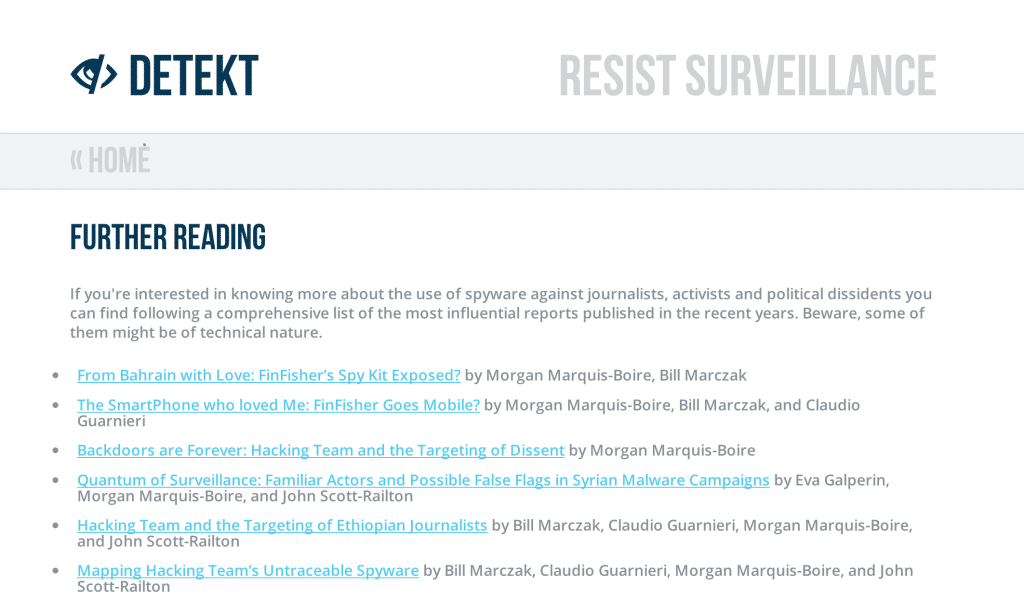The Electronic Frontier Foundation (EFF) is having a big week. First the organization announced “Let’s Encrypt,” a new, free certificate authority (CA) with the goal of moving everyone to adopt encrypted web communications. Then, today, the group announced Detekt, a malware detection tool designed to expose evidence of state surveillance. The tool is intended to help journalists, political activists and others identify malware associated with state-sponsored spying. Developed by security researcher Claudio Guarnieri, Detekt is available on Github and at the site resistsurveillance.com. The tool was written in Python tool and scans the memory of Windows systems (XP and 32 and 64 bit and Windows 8) for malware. Essentially, its a straight-up malware scanner that focuses on malware associated with spying, namely: DarkComet RATm XtremeRAT, BlackShades RAT, njRAT, FinFisher FinSpy, HackingTeam RCS, ShadowTech RAT and Gh0st RAT. You might also like “Hacker takes on the Worlds spy agencies.” Alas, unlike most anti malware programs (which at least claim to detect the same malware families) […]
BlackEnergy
Report: DHS and FBI Briefing Grid Operators on Sophisticated Cyber Attacks
A spate of reports in recent days has put the media’s attention back on the security of the energy sector and critical infrastructure more broadly. Notably: this CNN report that cites NSA director Admiral Mike Rogers telling the audience at a power grid security conference in San Antonio, Texas in October that “power… is one of the segments that concerns me the most.” What’s changed? For one: the uptick in ICS-specific malware like BlackEnergy. A spate of attacks based on that malware and others have targeted critical infrastructure players in recent months. According to a confidential memo obtained by CNN, the FBI and DHS are now traveling the country to warn utilities and other critical infrastructure owners about targeted attacks on industrial control systems. Some of those attacks are exploiting previously unknown (or “zero day”) vulnerabilities in ICS systems, CNN reported. The U.S. Government has been warning about the threat of cyber attacks on […]
Biggest Threat to Critical Infrastructure? Lack of Imagination
The threats to critical infrastructure in the U.S. and elsewhere are so plentiful that even trying to enumerate them is futile (and not a bit depressing). But – if we were to rank them in order of importance – what would be at the top of that list? Clearly, as this blog has noted, software security is a major concern. Recently, the Industrial Control System CERT (ICS-CERT) warned about a sophisticated malware campaign targeting users of HMI (human-machine-interface) technology from leading vendors. In at least some cases, the systems targeted were exposed directly to the Internet, making compromise simple. In other cases, industrial control system software is deployed with default administrator credentials, or easy to guess passwords. In other words: while some attackers are persistent and clever, many critical infrastructure owners make their job pretty easy. So, perhaps, its not software insecurity that belongs at the top of the list, […]
Malware Campaign Against Industrial Systems Almost 3 Years Old
The U.S. Government’s Industrial Control System CERT (ICS-CERT) said on Thursday that a campaign targeting industrial control system (ICS) software began in January, 2012 and targeted industrial systems that were directly connected to the public Internet. ICS-CERT said in an alert published on Wednesday that “HMI” (or Human-Machine Interfaces) products from vendors including GE, Advantech/Broadwin and Siemens may have been infected with variants of the BlackEnergy malware since January, 2012. Infected firms were running versions of the GE’s Cimplicity, Advantech/Broadwin’s WebAccess or Siemens’ WinCC with what ICS-CERT called a “direct Internet connection.” In some cases, as with the GE Cimplicity attacks, hackers exploited a known vulnerability in the Cimplicity software to gain access. In others (as with WebAccess and WinCC) the method by which the software was compromised isn’t known, ICS-CERT said. CERT said it hasn’t documented any cases of control processes being modified by the malware. However, BlackEnergy is typically used […]



